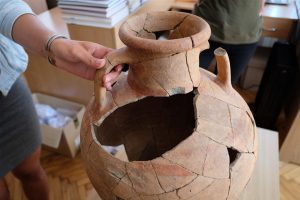The first ever Greek amphora discovered in the country was unearthed by archaeologists excavating the ringfort at Chotyniec, South-eastern Poland. The 2500-years-old site is believed to be the farthest West settlement connected with the Scythian people and the sphere of cultural influence of their nomadic civilisation.

The discovery at the Chotyniec ringfort, is believed to be of national importance. The Greek storage vessel was discovered in the place believed to be a ritual area of the settlement. Archaeologists state that the amphora might have been ritually smashed, for example after being emptied during a feast – as indicated by a nearby found large concentration of animal bones belonging to a boar or a pig. The vessel has been already put together from the discovered fragments. Moreover, archaeologists collected soil samples from the dirt adjacent to some shards of the vessel, hoping that closer analysis might reveal more of what was stored inside.

The amphora measures around 60 centimetres in height. It’s surface is painted with two broad red bands. The excavations at the site have ended for this season. The area linked with ritual activities has been excavated in about 25%. Archaeologist also uncovered parts of other vessels, typical Scythian bronze arrowheads, bronze pins, spindle whorls, and clay objects.

(after Nowiny24, Darek Delmanowicz & Nauka w Polsce)